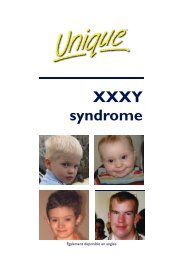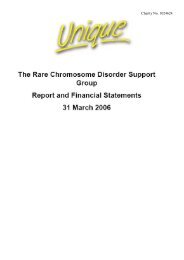Tetra X FTNW.pub - Unique - The Rare Chromosome Disorder ...
Tetra X FTNW.pub - Unique - The Rare Chromosome Disorder ...
Tetra X FTNW.pub - Unique - The Rare Chromosome Disorder ...
Create successful ePaper yourself
Turn your PDF publications into a flip-book with our unique Google optimized e-Paper software.
Does <strong>Tetra</strong>somy X affect behaviour?<br />
<strong>The</strong>re is no consistent behaviour pattern for all girls with<br />
tetrasomy X. Nonetheless, certain traits appear to occur<br />
more commonly. Most are described as pleasant and<br />
affectionate, but some have a tendency to be shy. In<br />
surveys by the support groups, sixteen families (50 per<br />
cent) noted some emotional and behavioural problems.<br />
Most problems were caused by frustration at girls’<br />
inability to communicate but families also noticed<br />
impatience, bad temper, temper tantrums and rapid<br />
mood swings. Self confidence might be low and girls were<br />
typically sensitive to stressful environments. In particular,<br />
nine out of 11 families mentioned behaviour problems in<br />
girls over the age of 18.<br />
Six out of 14 families of girls aged 15 or more had<br />
experienced psychiatric problems, including panic attacks,<br />
generalised anxiety disorder, depression and bipolar<br />
(manic-depressive) disorder. Psychiatric problems were<br />
controlled with medication.<br />
This picture is mirrored in research reports in which girls<br />
are described as pleasant, friendly and co-operative, but<br />
also potentially aggressive and emotionally labile. Half of<br />
all adult women had monthly or bi-monthly episodes of<br />
unstable behaviour which was described as angry,<br />
disruptive and inappropriate.<br />
Social concerns<br />
<strong>The</strong>re is accumulating evidence that some girls with<br />
tetrasomy X are vulnerable to social difficulties. However,<br />
this is not a consistent picture. Some girls are timid and<br />
lack self confidence, especially in groups and even within<br />
the family. As young girls, they may prefer to play alone.<br />
As teenagers, they may want friends but not know how<br />
to make and keep them and may behave in ways that<br />
others find inappropriate.<br />
On the other hand, there are girls who are socially<br />
confident and outgoing.<br />
<strong>The</strong> increased vulnerability to social problems means that<br />
families should have a high index of concern and not<br />
hesitate to enlist support. This is particularly important in<br />
stressful situations that can arise at school (Telfer 1969;<br />
Nielsen 1977; Berg 1988; Linden 1995; U).<br />
11
















